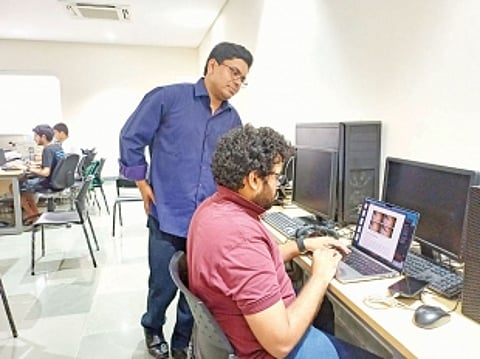

VASCO: It was a love at first sight with computers for Prof (Dr) Kunal Korgaonkar, who got hooked on to the machine the moment he saw it in the local bank, where his father worked. This love affair went on to shape his destiny.
“Looking at those machines, I wondered what all computers could do in the future. That thought led me to pursue computer engineering degree at Goa College of Engineering and later a Masters at IIT Madras,” said Prof Korgaonkar, Assistant Professor, Computer Science and Information Systems Department and Lead Researcher of ‘Confluences of Computing Lab’, BITS Pilani, Goa Campus.
Thereafter, he completed PhD from the University of California, San Diego in USA, which has one of the best computer science and engineering departments in the country.
“I did my postdoctoral work from Technion at Haifa in Israel. My specialisation is in designing and building computer systems of all kinds, from the ground up, especially using emerging technologies,” he said.
The young computer engineer was away for 10 years and made a mark for himself in the field of computing. But instead of following the lure of a promising future abroad, he chose to return home to serve his people.
“More the time I spent outside India, the more I realised that it is not the people that inherently limit what we can do. It is the institutions and systems we have built that limit us. I saw no reason why excellence cannot be achieved anywhere. Since I had my roots here, it made sense to start the post PhD career from here and see where it takes me,” Prof Korgaonkar said.
With this in mind, he has started working towards developing low-cost robotic surgery equipment, which would be affordable for government hospitals and facilitate precision surgery.
“Currently, most robotic surgery equipment is imported and hence very expensive. For instance, the well-known Da Vinci system costs 1.4 million US dollars (Rs 7 crore) and annual maintenance costs of one lakh US dollar (Rs 80 lakh) with a lifespan of five years,” he said.
“This makes such systems unaffordable to many small and medium-scale hospitals. We intend to leverage advancements in machine learning, robotics and computer systems to bring the cost to make or build to under Rs 50 lakh. Deploying such systems will be a big boost to surgeons and patients,” he added.
He has also hired talent from local engineering colleges as junior research fellows and as PhD students to work in the upcoming state-of-the-art labs for doing interdisciplinary research and development projects.
“I am also mentoring students and hiring interns from local colleges in order to create a pool of local talent. We plan to engage with Goa Medical College and some of the local private hospitals too. Ultimately the local deep-tech ecosystem has to be developed, for us all to succeed at national and international levels,” he said.
His future plan is to “contribute meaningfully” to India’s and Goa’s success story.